虚拟语气精讲
高中英语-虚拟语气精讲(超全整理篇)ppt课件

这些动词相对应的名词性从句也用should do
It is ord(e一r)e.d主/语c从o句mmanded /
should/would/could/mig ht + do
最新版整理ppt
7
1) If he has time,he will go shopping tonight.
与事实相反!
2) If I had time,I would visit you.
最新版整理ppt
8
与过去事实相反
虚拟条件句
主句
最新版整理ppt
♥பைடு நூலகம்27
1“坚持” insist
2“命令” order, command
3“建议” advise, suggest, propose, recommend
4“要求” ask, demand, require, request, desire
+ (that) sb (should) do ... 或是 (that) sb / sth (should) be done
3. were to do 最新版整理ppt
15
If虚拟句的省略和倒装
最新版整理ppt
16
如果条件状语中有were, had, should时, 可以省略 if倒装成:Were / Should / Had +主+其他
如If果I w我er是e 你yo,u, 我I w会ou再ld试try一it次ag。ain.
高中英语之虚拟语气详细讲解
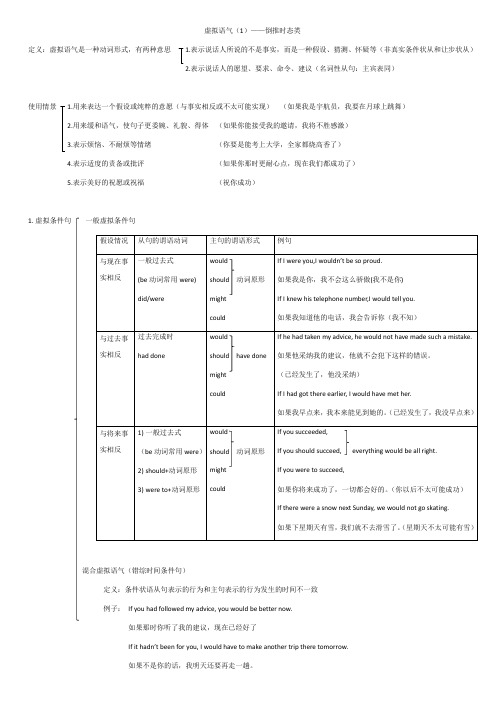
虚拟语气(1)——倒推时态类定义:虚拟语气是一种动词形式,有两种意思 1.表示说话人所说的不是事实,而是一种假设、猜测、怀疑等(非真实条件状从和让步状从)2.表示说话人的愿望、要求、命令、建议(名词性从句:主宾表同)使用情景 1.用来表达一个假设或纯粹的意愿(与事实相反或不太可能实现)(如果我是宇航员,我要在月球上跳舞)2.用来缓和语气,使句子更委婉、礼貌、得体(如果你能接受我的邀请,我将不胜感激)3.表示烦恼、不耐烦等情绪(你要是能考上大学,全家都烧高香了)4.表示适度的责备或批评(如果你那时更耐心点,现在我们都成功了)5.表示美好的祝愿或祝福(祝你成功)1.虚拟条件句一般虚拟条件句混合虚拟语气(错综时间条件句)定义:条件状语从句表示的行为和主句表示的行为发生的时间不一致例子:If you had followed my advice, you would be better now.如果那时你听了我的建议,现在已经好了If it hadn’t been for you, I would have to make another trip there tomorrow.如果不是你的话,我明天还要再走一趟。
If you had studied hard before,you would be a college student now.如果你以前努力学习的话,你现在就是大学生了。
省略+倒装当虚拟条件句的谓语动词中含有were,should,had时,if可以省略,并将were,should,had提前于句首,变为倒装句。
如果虚拟条件句是否定句,not 保留在原处If he should agree to go there, we should send him there.= Should he agree to go there,we should send him there.If she were there,she would agree with us.= Were she were, she would agree with us.If he had learnt about computers,we would have hired him.= Had he learnt about computers,we would have hired him.含蓄虚拟条件句定义:有时为了表达的需要,在虚拟语气中并不总是出现if引导的条件状语从句,而是通过其他手段来代替条件从句分类:1) but for....=(If it+be not for) ;without;Without your help ,we couldn’t have finished the work ahead of time.= But for your help,we couldn’t have finished the work ahead of time.= If it hadn’t been for your help,we couldn’t have finished the work ahead of time.没有你的帮助,我们不可能完成任务。
虚拟语气精讲
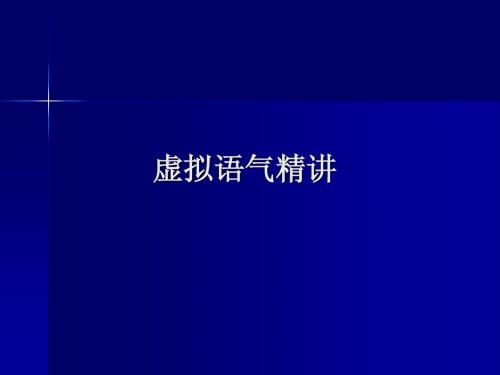
It is (high/about) time… It is time you thought abou time… t your future. would rather… I would rather you didn’t speak rudel rather… didn’ y to her. (与现在事实相反) 与现在事实相反) I’d rather you hadn’t spoken rudely to her. (与过去 hadn’ 事实相反) 事实相反) Lest… Lest…, in case…, for fear that…(引导的是目的状 case… that… 语从句,但可归入第六点(名词从句虚拟) 语从句,但可归入第六点(名词从句虚拟),这是因它 们答案特征相同,即 (should)+动词原形。 (should)+动词原形。 eg. He took his umbrella lest it should rain.
最经典最清晰虚拟语气讲解
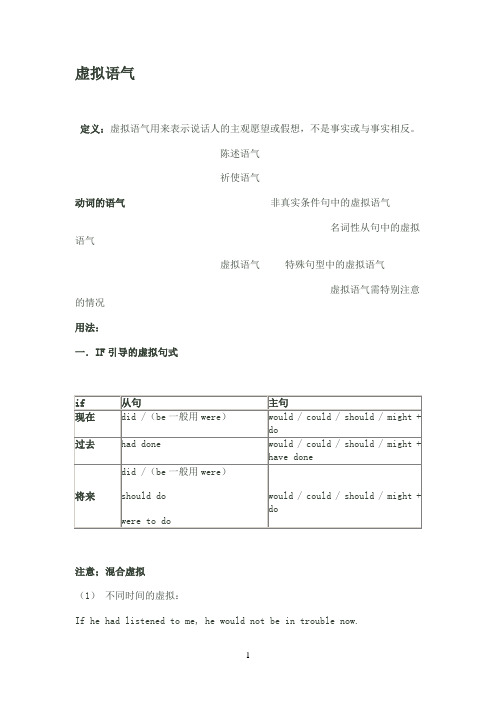
虚拟语气定义:虚拟语气用来表示说话人的主观愿望或假想,不是事实或与事实相反。
陈述语气祈使语气动词的语气非真实条件句中的虚拟语气名词性从句中的虚拟语气虚拟语气特殊句型中的虚拟语气虚拟语气需特别注意的情况用法:一.IF引导的虚拟句式注意;混合虚拟(1)不同时间的虚拟:If he had listened to me, he would not be in trouble now.If he had told me yesterday, I should know what to do now.(2) 虚拟与陈述的混合:He could have passed the exam, but he wasn’t careful enough. You should have come earlier, the bus left a moment ago.二.名词性从句中的虚拟语气:从句谓语动词(should) +do1.主语从句:it is + adj + that结构2.宾语从句:主语+要求接虚拟语气的动词+that一个坚持:insist两个命令:order; command 两个决定:decide; determine三个建议:suggest; advise; propose四个要求:demand; ask; request; require注意:① suggest:暗示;insist:坚持说(不虚拟)② except, believe, think suspect等动词的否定形式或疑问句后面的宾语从句要用虚拟。
I never thought that he should be such a brave young solider③ should竟然I am glad that your novel should have won the first prize.④ wish引导从句的虚拟语气,谓语动词变化和if从句虚拟语气一样。
虚拟语气精讲精练总结

What would you do if you won the lottery? If I won the lottery, I would…
If I won the lottery, I would buy an expensive car.
If I had a lot of money,
1. if only 意为:若是...那该多好啊; 真希望...; 只要, 只要...就好 表示现在的情况,应用过去式; 如果是过去的情况,应用过去完成时态
If only I had arrived in time !
If only she didn’t drive so fast.
I wish I ________ you yesterday.
His silence at the meeting suggested that he ________ to your plan.
A.didn’t agree B.hadn’t agreed
C.wouldn’t agree D.not agree
NOTES:
与现在相反
例: If I were a teacher, I would be strict with my students.
If I had HIV, I would know because I would feel sick.
had HIV
would feel
were
would be
had driven
If he more carefully, he the car accident yesterday.
would not have had
If I how to swim, I trapped in this island. had learnt would not have been
(完整版)虚拟语气详解
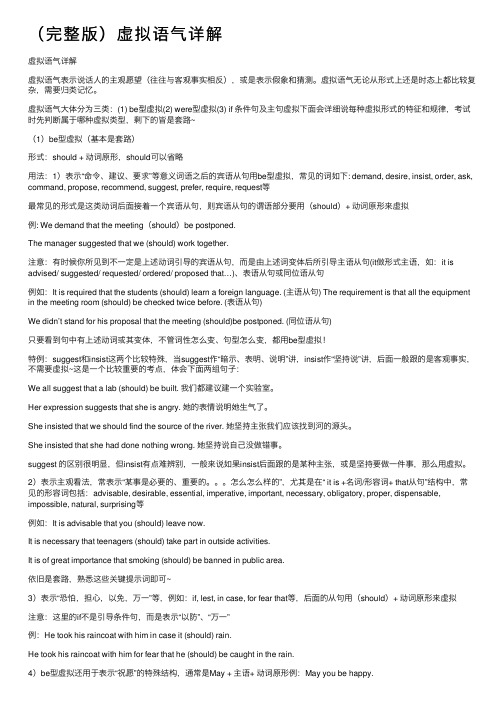
(完整版)虚拟语⽓详解虚拟语⽓详解虚拟语⽓表⽰说话⼈的主观愿望(往往与客观事实相反),或是表⽰假象和猜测。
虚拟语⽓⽆论从形式上还是时态上都⽐较复杂,需要归类记忆。
虚拟语⽓⼤体分为三类:(1) be型虚拟(2) were型虚拟(3) if 条件句及主句虚拟下⾯会详细说每种虚拟形式的特征和规律,考试时先判断属于哪种虚拟类型,剩下的皆是套路~(1)be型虚拟(基本是套路)形式:should + 动词原形,should可以省略⽤法:1)表⽰“命令、建议、要求”等意义词语之后的宾语从句⽤be型虚拟,常见的词如下: demand, desire, insist, order, ask, command, propose, recommend, suggest, prefer, require, request等最常见的形式是这类动词后⾯接着⼀个宾语从句,则宾语从句的谓语部分要⽤(should)+ 动词原形来虚拟例: We demand that the meeting(should)be postponed.The manager suggested that we (should) work together.注意:有时候你所见到不⼀定是上述动词引导的宾语从句,⽽是由上述词变体后所引导主语从句(it做形式主语,如:it is advised/ suggested/ requested/ ordered/ proposed that…)、表语从句或同位语从句例如:It is required that the students (should) learn a foreign language. (主语从句) The requirement is that all the equipment in the meeting room (should) be checked twice before. (表语从句)We didn’t stand for his proposal that the meeting (should)be postponed. (同位语从句)只要看到句中有上述动词或其变体,不管词性怎么变、句型怎么变,都⽤be型虚拟!特例:suggest和insist这两个⽐较特殊,当suggest作“暗⽰、表明、说明”讲,insist作“坚持说”讲,后⾯⼀般跟的是客观事实,不需要虚拟~这是⼀个⽐较重要的考点,体会下⾯两组句⼦:We all suggest that a lab (should) be built. 我们都建议建⼀个实验室。
高考英语语法:虚拟语气讲义

虚拟语气虚拟语气表示动作或状态与事实相反,或不可能发生的情况。
一、虚拟语气用于条件状语从句中从句主句与现实事实相反一般过去式(be--were)Should/would/could/might + V原与过去事实相反Had + done Should/would/could/might +have done与将来事实相反过去式;should+V 原;were to + V原Should/would/could/might + V原1. 表示与现在事实相反或不可能发生:条件状语从句:一般过去时(虚拟语气中be→were)主句用:would(should, could, might)+动词原形。
If we had time now, we would read it again.If I were you, I would work hard.2. 表示与过去事实相反或不可能发生:条件状语从句:had+过去分词;主句:would(should, could, might)+have+过去分词。
If he had taken my advice, he would have succeeded in the test.If I had known your telephone number then, I would have called you.3. 表示与将来的事实可能相反或不可能发生:条件状语从句:①一般过去时②should +动词原形③were to+动词原形;主句:would(should, could, might)+动词原形。
If it should rain, the crops would be saved.If it were to snow tomorrow, they would not go out.例句:If there were no subjunctive mood, English ( ) much easier to learn. (B)A. could have beenB. would beC. will beD. would have been(2)省略if的虚拟语气如果从句中含有were/ should/ had时,则可以把这三个词置于句首,省略if.采用倒装语序。
虚拟语气讲解版
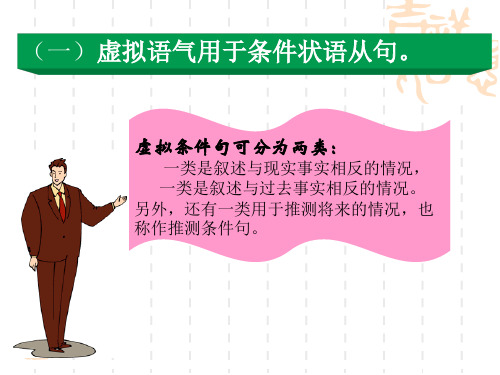
2. 虚拟语气用于 if only引导的感叹句中
If only 引导的是省略了表示结果的主句的虚拟 语气结构,现已成为惯用法,表达愿望一种不真实的 条件,译成“要是……就好了!” 从句用过去时表示现在没有实现的愿望, 对过去没有实现的或不能实现的愿望,从句就用过去 完成时。
If only I had taken his advice.我要是听他的话就好 了.
等.
I wish it were spring all the year round.
I wish you could go with us.
We wish we had arrived there two hours earlier.
2. would/had rather
would sooner/prefer+object clause 在虚拟语气中的用法表 示希望或婉转的责备。
E.g. 1.I intended I should call on you , but I was busy at that time. 2.I am sorry ,but I really didn’t mean to hurt. 3.I had planned to travel to Canada, but I had something more important to cope with.
I didn’t hear the phone, I must have been sleeping..
五)虚拟语气用于主语从句.
在主语从句中,谓语动词的虚拟语气结构用“ should 十动词原形”的结构,表示惊奇、不相信、惋惜、理应 如此等. 句型:It is /was+ 形容词/过去分词/名词 + that ……
- 1、下载文档前请自行甄别文档内容的完整性,平台不提供额外的编辑、内容补充、找答案等附加服务。
- 2、"仅部分预览"的文档,不可在线预览部分如存在完整性等问题,可反馈申请退款(可完整预览的文档不适用该条件!)。
- 3、如文档侵犯您的权益,请联系客服反馈,我们会尽快为您处理(人工客服工作时间:9:00-18:30)。
表示说话人的建议、请求、邀请和命令等。
Open the door, please. Never be late again!
虚拟语气( subjunctive mood )
表示动作或状态不是客观存在的事实,而是说话人的主观愿望、假设或推测等。
If I were you, I would not leave her alone. If I were a bird,I would be able to fly in the air. I wish I could pass the examination. Our teacher suggested that we (should) go to the library this afternoon. May you succeed!
M6 U3
Grammar and usage
Subjunctive Mood in if-clause
Lead-in If I were a boy 如果我是个男生
Let's listen : enjoy a song
If I were a boy
If I __w__e_re___ a boy I ___w_o_u_ld__ro_l_l ___ out of bed in the morning And chase after girls I __w_o_u_l_d_k_ic_k___it with who I wanted And Iw_o_u_l_d_n_e_v_e_r_g_e_t_confronted for it
B.非真实条件句:表示假设或实际可能性不大的甚至完全不可能 发生的情况,故采用虚拟语气。
If I were you,I would go at once.(我不可能是你。非真实) If there were no air,people would die.(不可能没有空气。非真 实)
Guidance & Exploration
Self-study
What kind of situations are following sen
Unreal situations
Did you meet me three years ago?
Am I your Chinese teacher now?
应用:
条件状语从句 目的状语从句
宾语从句 固定句型
A.真实条件句:表示条件是真的或有可能实现的, 采用陈述语气。
If he doesn't hurry up,he will miss the bus.( 真实) If he is free,he will ask me to tell stories.( 真实)
No
Guidance & Exploration
一:语气的定义和种类:
语气(Mood):动词的一种形式,表示说话人对某一行为或事情的看法和态度。
陈述语气( indicative mood )
表示动作或状态是现实的、确定的或符合事实的,用于陈述句、疑问句或感叹句。 Iraq is an Asian country. What a fine day it is!
If I __w_e_r_e___ a boy I think that I c_o_u_l_d_u_n_d_e_r_s_ta_n_d__ how it feels to love a girl I swear I _w__o_u_ld__b_e___ a better man I _w_o_u_ld__li_s_te_n__to her
二:非真实条件句 Unreal conditionals
Activity one 1.Three forms of if clauses for unreal conditionals
Activity two 2.Ellipsis of if for unreal conditionals -inverted sentence
Guidance & Exploration Activity one
1.Three forms: Find out the rules
1). state an imaginary present condition If he was good at English, I would be happy now. If I were you, I would study much harder. If I lived on the moon, I might see the beauty—Chang’e.
Learning aims:
1.Know the definition and kinds of mood. 2.Grasp three forms of if-clauses for unreal conditionals. 3.learn to identify an unreal conditional in a sentence 4. learn when and how to use the unreal conditionals
Conclusion If … were/did … ,
… should/would/could/might do …
Practice:
1.如果我是你,我可能会告诉他真相。 If I ____ you, I _______________him the truth. 2.If my brother _____ here, everything ______ all right. 3. If I ______(have) a lot of money, I ___________ (buy) a ticket. 4.If I ________(work) hard, I __________ (have) money. 5.If I ______ one of them, I ________ (cheat) in the exam.
